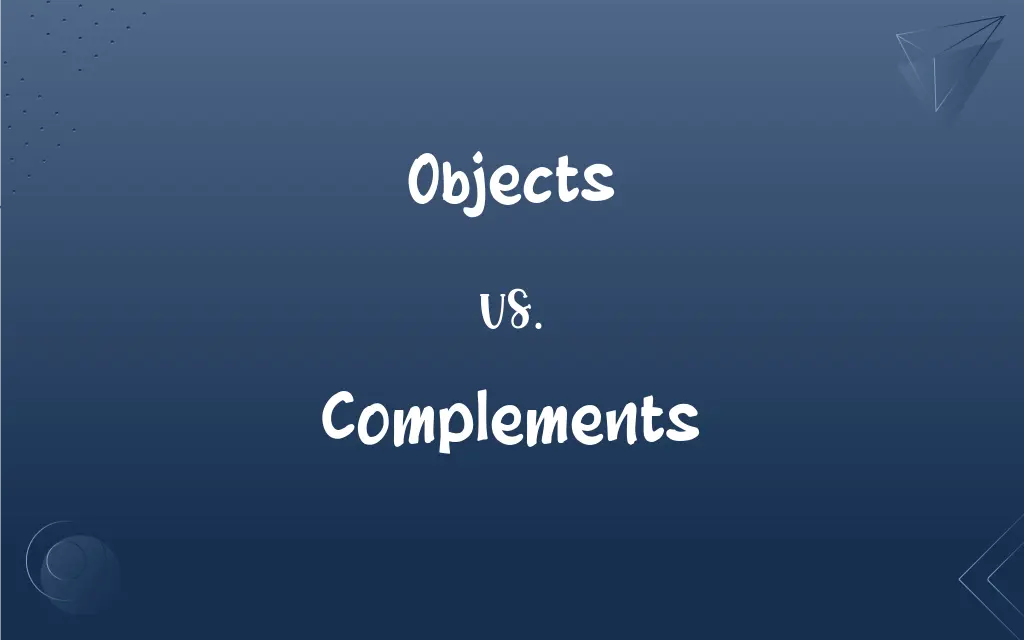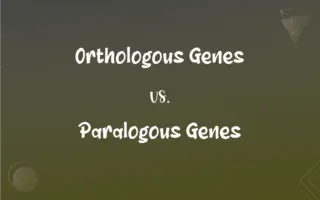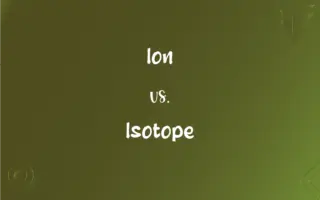Objects vs. Complements: What's the Difference?
Edited by Aimie Carlson || By Janet White || Published on February 15, 2024
Objects receive the action in a sentence, while complements complete or give more information about the subject or object.

Key Differences
Objects in a sentence are nouns or pronouns that receive the action of the verb. For example, in "She threw the ball," 'the ball' is the object. Complements, on the other hand, provide additional information about the subject or object, often identifying or describing them. In "She is a teacher," 'a teacher' is the complement, describing the subject 'She'.
Objects can be direct (receiving the action directly) or indirect (receiving the action indirectly). For example, "She gave him a gift"; 'a gift' is the direct object, and 'him' is the indirect object. Complements can be subject complements (linked to the subject) or object complements (linked to the object), providing additional information or identity. For instance, "The movie made her happy"; 'happy' is an object complement.
The presence of an object in a sentence depends on whether the verb is transitive (requires an object) or intransitive (does not require an object). Complements are used with linking verbs (like 'be', 'seem', 'become') to add information about the subject or object.
In grammatical structure, objects follow the verb directly in a sentence. Complements, however, follow linking verbs and are necessary to complete the meaning of the sentence. Without the complement, sentences with linking verbs might sound incomplete.
Objects are relatively straightforward, either receiving the action directly or indirectly. Complements, however, can be more complex, sometimes consisting of entire clauses, and are essential to provide a complete understanding of the subject or object.
ADVERTISEMENT
Comparison Chart
Definition
Nouns/pronouns receiving the action
Provide additional information about subject/object
Dependency on Verbs
Require transitive verbs
Linked with linking verbs
Types
Direct and indirect
Subject and object complements
Role in Sentence
Follow the action verb
Follow linking verbs and complete their meaning
Grammatical Importance
Not always essential for sentence completeness
Essential for sentence completeness with linking verbs
ADVERTISEMENT
Objects and Complements Definitions
Objects
Objects often follow transitive verbs in a sentence.
They moved the chair. (chair is the object)
Complements
Subject complements follow linking verbs and describe the subject.
The sky became dark. (dark is the subject complement)
Objects
Objects can be direct, receiving the action directly.
He kicked the ball. (ball is the direct object)
Complements
A complement is a word or phrase that completes the sentence's subject or object.
She is a doctor. (doctor is the subject complement)
Objects
An object is a noun or pronoun that receives the action of the verb.
She reads a book. (book is the object)
Complements
Complements are essential for completing the meaning of sentences with linking verbs.
He seems tired. (tired is the subject complement)
Objects
Objects can also be indirect, receiving the action indirectly.
She gave him a gift. (him is the indirect object)
Complements
Object complements follow and describe the object.
They elected her president. (president is the object complement)
Objects
Objects are integral to the action of the sentence.
I wrote a letter. (letter is the object)
Complements
Complements can be nouns, adjectives, or clauses providing additional details.
I found the movie interesting. (interesting is the object complement)
Objects
A specific, individual, material entity, especially one that is not living or not sentient.
Complements
Something that completes, makes up a whole, or brings to perfection
A sauce that is a fine complement to fish.
FAQs
What is an object in a sentence?
An object is a noun or pronoun that receives the action of a verb.
What is a complement in grammar?
A complement is a word or phrase that completes the meaning of the subject or object.
Are objects always necessary in sentences?
Objects are necessary in sentences with transitive verbs but not with intransitive verbs.
How do complements differ from objects?
Complements provide additional information about the subject or object, while objects receive the action.
Can a sentence have both direct and indirect objects?
Yes, some sentences have both types, like "She gave him a gift."
What types of verbs are associated with objects?
Objects are associated with transitive verbs.
What types of verbs are associated with complements?
Complements are commonly found with linking verbs like 'be', 'seem', 'become'.
Can a complement be a clause?
Yes, complements can be clauses, especially in complex sentences.
Are complements always necessary in a sentence?
Complements are necessary with linking verbs to complete the sentence's meaning.
Can objects be omitted in a sentence?
In sentences with intransitive verbs, objects can be omitted.
Do all sentences have complements?
No, only sentences with linking verbs or certain structures require complements.
How does an indirect object function in a sentence?
An indirect object receives the action indirectly, often indicating to whom or for whom the action is done.
What is an example of a subject complement?
In "The soup tastes delicious," 'delicious' is a subject complement.
Can a word be both an object and a complement?
Typically, a word serves either as an object or a complement in a sentence, not both.
What is the difference between a direct object and an indirect object?
A direct object directly receives the action of the verb, while an indirect object indirectly benefits from the action.
What is an example of an object complement?
In "They named their daughter Emma," 'Emma' is an object complement.
How do complements affect the meaning of a sentence?
Complements often provide essential information or attributes related to the subject or object, affecting the overall meaning.
Are complements related to the verb in a sentence?
Complements are related to the verb, especially linking verbs, providing additional information about the subject or object.
How do objects and complements contribute to sentence structure?
Objects complete the action of the verb, while complements provide additional information to complete the sentence meaning.
Can objects be phrases?
Yes, objects can be noun phrases, not just single words.
About Author
Written by
Janet WhiteJanet White has been an esteemed writer and blogger for Difference Wiki. Holding a Master's degree in Science and Medical Journalism from the prestigious Boston University, she has consistently demonstrated her expertise and passion for her field. When she's not immersed in her work, Janet relishes her time exercising, delving into a good book, and cherishing moments with friends and family.
Edited by
Aimie CarlsonAimie Carlson, holding a master's degree in English literature, is a fervent English language enthusiast. She lends her writing talents to Difference Wiki, a prominent website that specializes in comparisons, offering readers insightful analyses that both captivate and inform.







































































